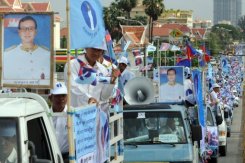
Cambodian
supporters of the opposition Sam Rainsy party campaign in Phnom Penh in
May 2012. Cambodia's two main opposition parties have joined forces to
challenge Prime Minister Hun Sen's 27-year grip on power at a general
election next July, a spokesman for the new group said Wednesday.
Published: 3/10/2012
Bangkok Post
Cambodia's two main opposition parties have
joined forces to challenge Prime Minister Hun Sen's 27-year grip on
power at a general election next July, a spokesman for the new group
said Wednesday.
The Cambodia National Rescue Party, formed by the Sam Rainsy Party
and the Human Rights Party, received official approval from the interior
ministry on Tuesday, said spokesman Pol Ham.
It will be headed by
opposition leader Sam Rainsy, who is seen as Hun Sen's main rival but
who lives in France to avoid prison for a string of convictions that
critics contend are politically motivated.
"We hope that if Sam
Rainsy can return we can win the election... or at least make it a
closer race," Pol said, adding that many grassroots party members
supported the move to team up.
For now, both parties will remain separate so that their elected officials can keep their seats until the next polls, Pol said.
At
the last parliamentary election in 2008, Hun Sen's ruling Cambodian
People's Party won 90 of the 123 seats in the National Assembly. The Sam
Rainsy Party took 26 seats and the Human Rights Party just three.
Hun
Sen, 61, has ruled the country since 1985 and has vowed to stay in
power until he is 90. His government is regularly accused of suppressing
political freedoms and mistreatment of rights campaigners.
Speaking
to supporters via videolink on Tuesday, Sam Rainsy, 63, vowed to return
to Cambodia by December. But the government insists he will have to
serve time in jail if he does.
"We have never banned him from
coming back -- it's his right. But the court already issued the verdicts
and if he returns he surely can't avoid the legal process," government
spokesman Keo Remy told AFP.
Sam Rainsy faces a total of 11 years
in prison. He was sentenced to 10 years in absentia in 2010 for
publishing a false map of the border with neighbouring Vietnam, though
the punishment was later reduced to seven years.
He was also
handed a two-year sentence for inciting racial discrimination and
uprooting border markings with Vietnam in a 2009 incident.
Last
year, he was given another two-year jail term for accusing the foreign
minister of being a member of the brutal Khmer Rouge regime in the late
1970s.

No comments:
Post a Comment